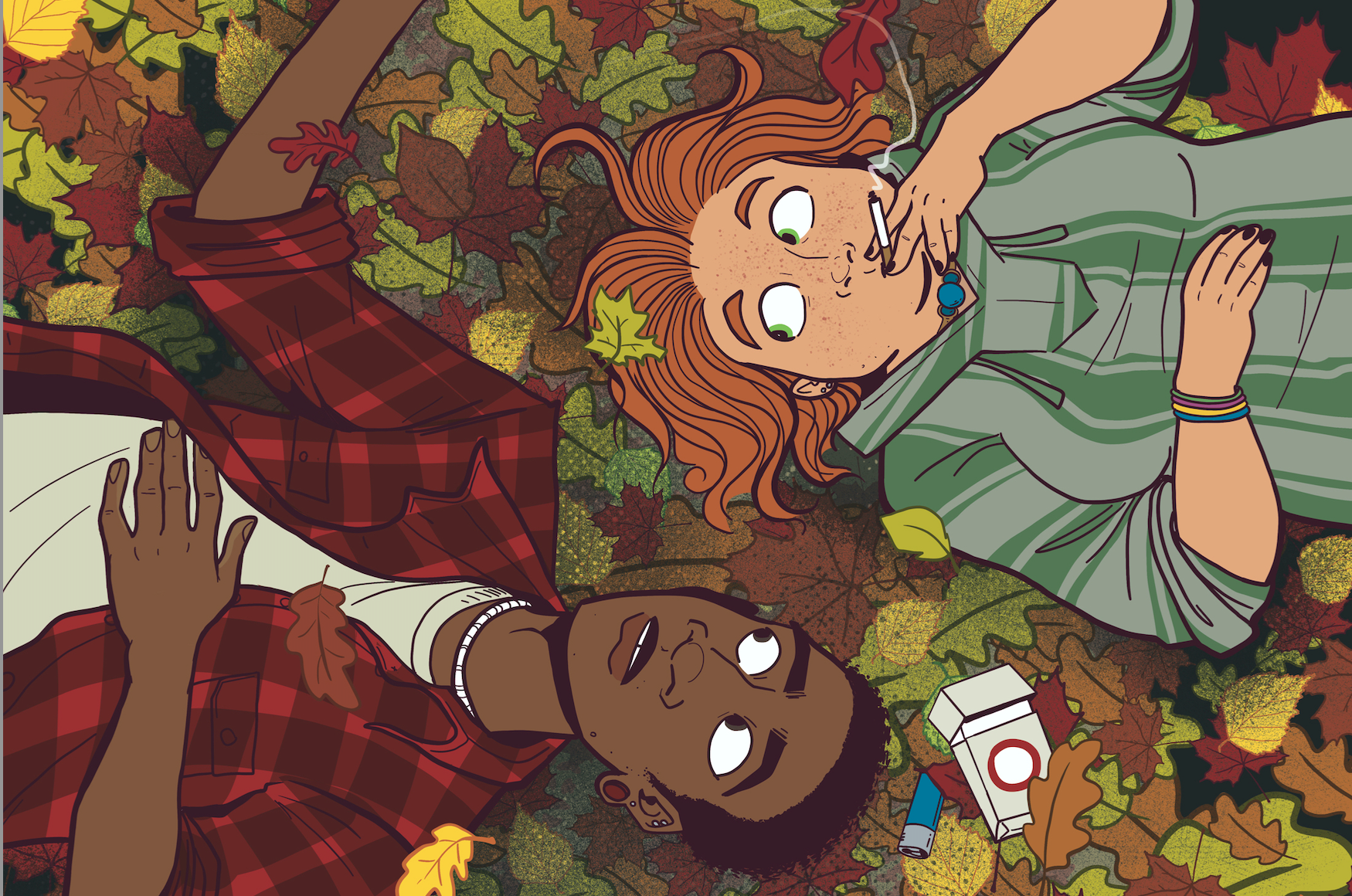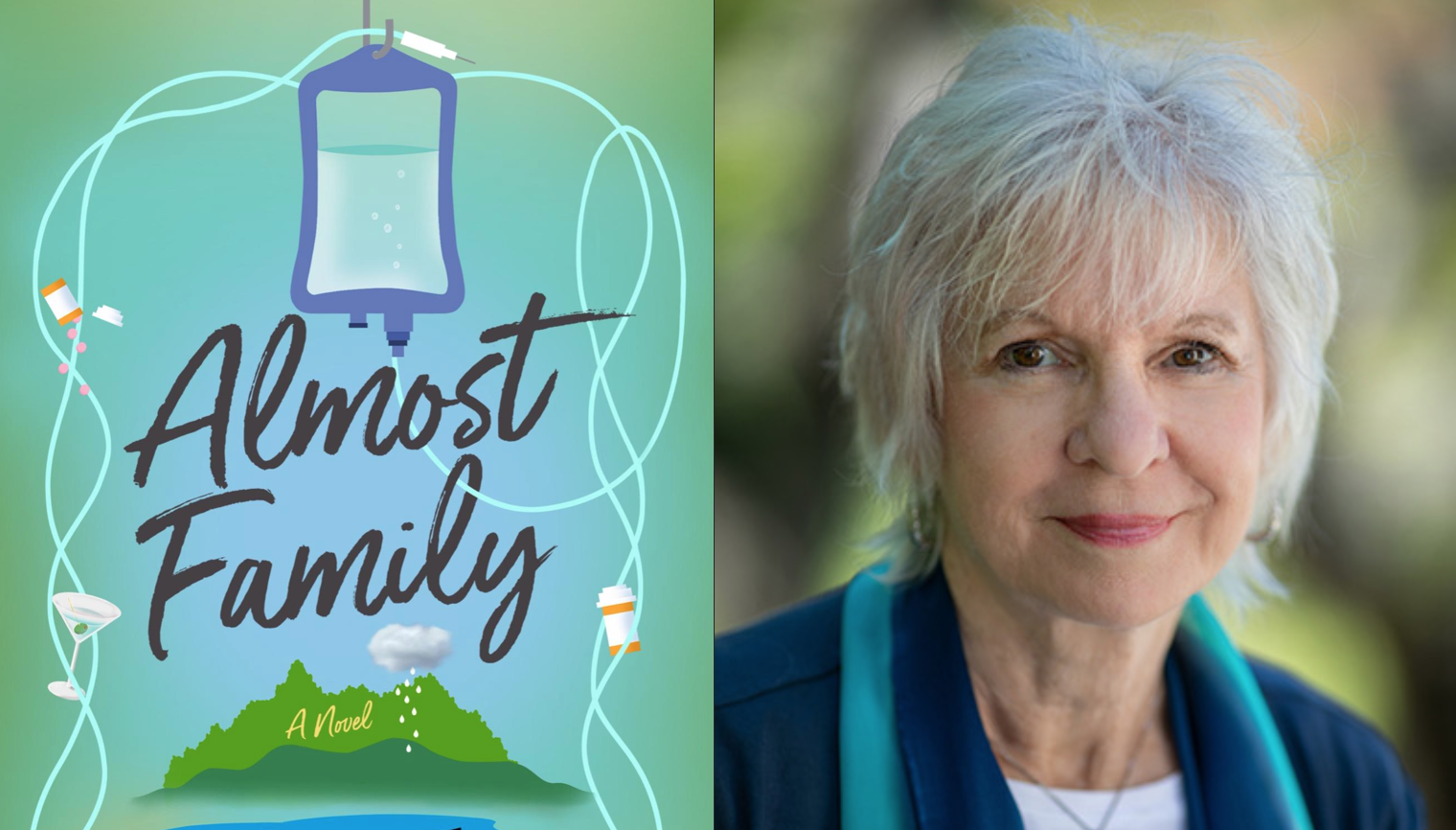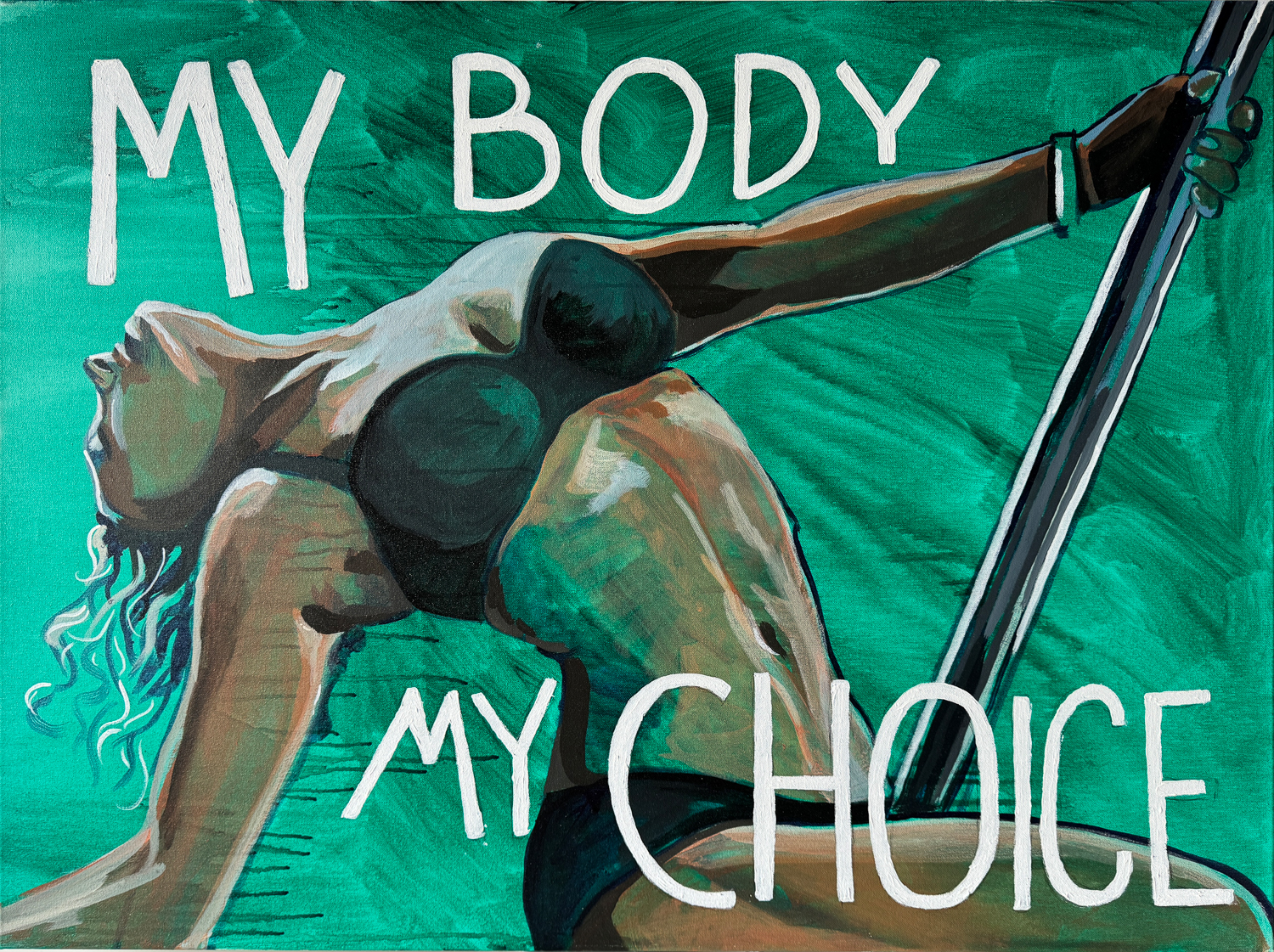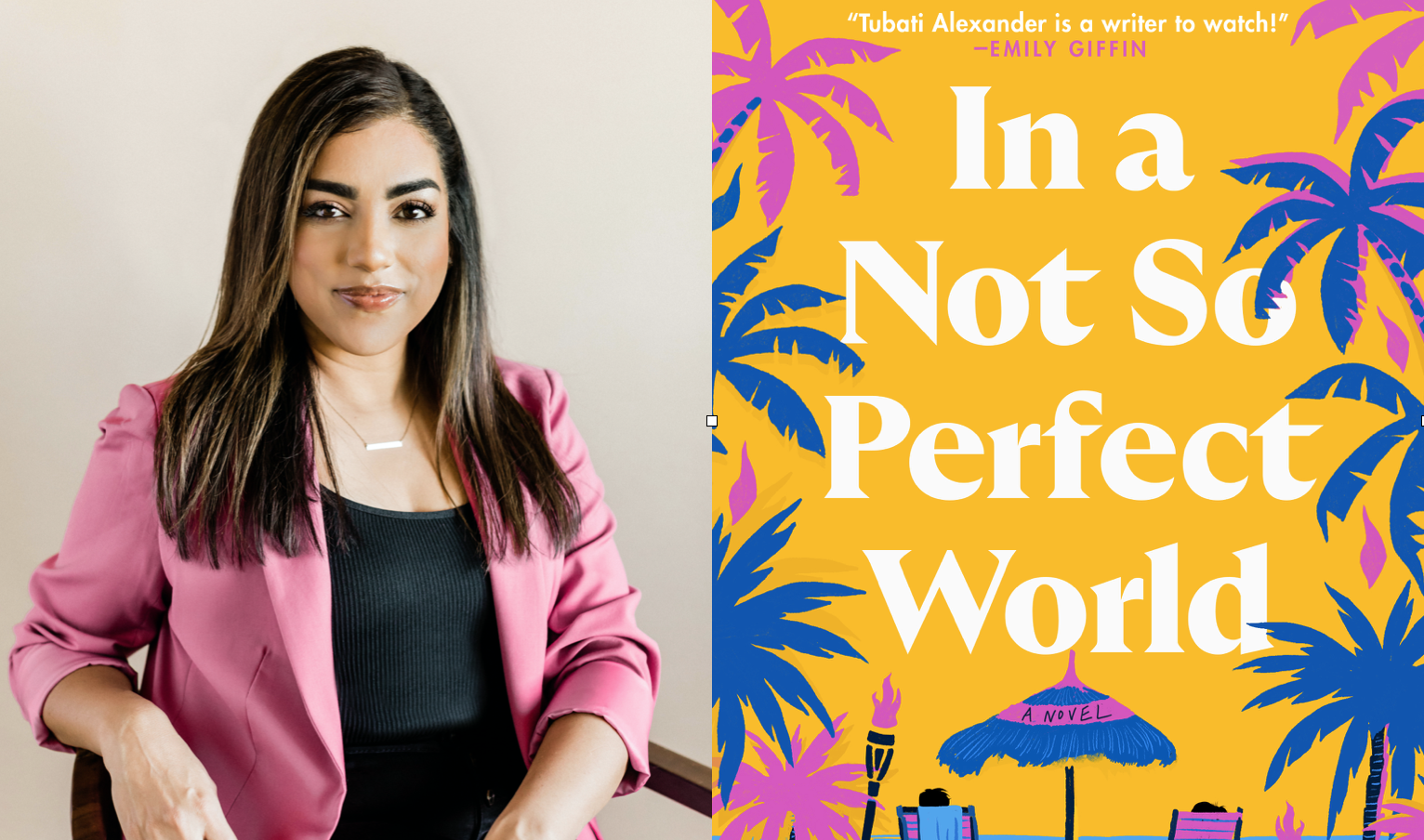
At a time when book-banning is clearly a movement to censor voices and lived experiences of the diversity across America, we are proud to always stand with authors and writers who want to share their stories in the hope of making others feel less alone in our divided world right now. Diversity, belonging, and identity are themes that are important to us, and we will always be committed to amplifying books and projects that promote this. And if you’re looking for great recs to add to your list, we’ve got you!
Queer author Arden Joy bursts onto the romance scene with her spicy, sweet, and sapphic debut “Keep This Off The Record” (Rising Action Publishing, Jan. 31, 2024). Arden vulnerably mines from her personal experience of identifying as a “late bloomer” in the queer community and her Jewish heritage in this rivals to lovers’ romance.
Abigail Meyer and Freya Jonsson can’t stand one another. But could their severe hatred be masking something else entirely? From the moment they locked eyes in high school, Abby and Freya have been at each other’s throats. Ten years later, when Abby and Freya cross paths again, their old rivalry doesn’t take more than a few minutes to begin anew. And now Naomi, Abby’s best friend, is falling for Freya’s producer and close pal, Will. Both women are thrilled to see their friends in a happy relationship – except they are now only a few degrees of separation from the person they claim to despise… and they can’t seem to avoid seeing one another. After their encounters repeatedly devolve into warfare, Abby and Freya’s friends decide their age-old rivalry can only mean one thing: true love. Will their friends bring them together? Or will Freya’s refusal to admit who she is keep them from discovering their underlying passion?
‘Keep This Off The Record’ is a fun and fresh LGBTQIA+ story about the freedom to be who you are, even if that means falling for the person you hate. Through her hilarious and lovable characters Arden displays the multifaceted aspects of Judaism and the myriad of queer identities that make up the fabric of the LGBTQ+ community. The novel is a queer retelling of the Shakespearean classic “Much Ado About Nothing”, representing multiple types of queer identities in the main characters, as well as nonbinary representation in secondary characters.
In addition to be a debut author, Arden is also the founder of a website called Girls Who Travel, which is an inclusive and empowering community for solo female travelers. Clearly she is a woman dedicated to fostering a world that is more inclusive, and does this in multiple ways!
We had the chance to speak with Arden about her new book, how she wove various aspects of Judaism into the story, the importance of putting queer characters at the center, and why traveling solo has had a huge impact on her life.

Where did your love of writing and storytelling began?
My mom loves to tease me about my grand entrance into the world—I apparently had this ‘I-know-what’s-up-and-I’m-not-thrilled’ vibe from day one. Truth be told, that’s probably when my love affair with storytelling and writing kicked off. I mean, let’s face it, life isn’t easy. But I quickly figured out that my imagination could create fun, adventure, joy, and even community to fill in the gaps when it’s missing in every day life.
And as I got older, I realized that when I write those stories down, I get the chance to share all those delicious things with other people. It’s like stumbling upon the most fantastic BOGO deal, and I’ve been holding onto it ever since.
Your new novel is a retelling of a Shakespeare classic, with an updated and queer twist. What can readers expect?
Much Ado About Nothing has been my favorite Shakespeare play since I was first introduced to it in high school. But, much like many of my friendships in high school, Billy and I drifted apart over the years. The stories and characters, written by a white man about white, straight men (and what he thought women and people of color were like) didn’t reflect my world, my life, and the people I loved.
One day, it just hit me: I could fix that. I could using storytelling to fill in the gaps, just like I had always done. I could empower the characters and bring a whitewashed story into a world as colorful as mine.
So that’s what I did. I invited ye olde damsels in distress to become queer women, women overcoming trauma, flawed and beautiful women who find love on their own terms.
So in my updated Shakespearean story, readers can expect all the hijinx that Shakespeare brought us but with new depth of character and story. And of course, new challenges like social media, reality tv, and even the occasional butt dial. The opportunity for misunderstandings, lies, and grand gestures that Shakespeare excelled at takes on a whole new level when you bring technology to the table.
Why is it important for you to write stories that center queer and non-binary characters and experiences?
When stories about yourself aren’t reflected in art, it’s like having a conversation where your voice isn’t heard – there’s a kind of silent pain that comes with feeling unseen. As a queer woman, I know that void well. I know that after a while, you can start to believe that you are as invisible as the stories around you make you feel. By writing stories that center the LGBTQ community, it shows that we’re more than just side characters in someone else’s story. It’s especially important for me to create characters who aren’t defined solely by their LGBTQ identity or the struggles they face. I want people to see themselves as they are: living their lives, navigating love, and dealing with everyday situations.
Stories also have this incredible power to shape perceptions. By portraying LGBTQ characters in a positive, everyday light, I’m get the chance to chip away at stereotypes and invite audiences to see the commonalities we share as humans. It’s not just about entertainment, it’s about contributing to a cultural shift towards acceptance and understanding. I believe that when people see our stories, it’s a step towards realizing that love, joy, and the human experience are universal, regardless of who you are.

Can you tell us more about LILYS – late in life lesbians, and how you have been sharing your own story with the world?
Apparently during the pandemic, a lot of straight women found themselves on the Lesbian side of TikTok. And the more their FYP filled up with queer women, the more they came to realize that they were, in fact, not straight afterall. They deemed themselves LILYS or late in life lesbians. And while the acronym is lacking in nuance it does gets the general idea across. Namely, even if it was always there, it may have taken longer to acknowledge and accept your sexuality.
Although my story didn’t start on my FYP, I love that this experience of accepting your sexuality later in life is becoming normalized. As women, we are not encouraged to listen to our bodies, to see ourselves outside of the male gaze, or to pursue our physical wants and needs. Fold that in with bigotry, homophobia, and maybe sprinkle in some politics and religious trauma and it becomes clear how easy it is to wall off an entire part of yourself until you don’t even know it’s there.
The clues that I was queer were there pretty early on but I grew up in a conservative community where anything but cis-gender, hetrosexual love wasn’t an option. And since I was also attracted to men, that made things pretty simple for me: I was straight.
Even though I got out of the conservative space and mindset. Even though my first kiss (and many after) was with a girl. Even though I spent most of my time in LGBQT friendly spaces. Even though most of my friends were LGBTQ. Even after all that, if you asked me, I would tell you that I was straight.
Deconstructing a way of thinking isn’t simply about taking apart what you believe. It’s about rebuilding yourself under a new paradigm. You have to start from scratch and discover who you are without all the fear, shame, guilt, and whatever else society has thrown at you. And that’s not easy – you’re not only losing the self you knew but you risk losing the people you knew too.
Part of my process was creating a character that shared my story. It isn’t always easy to explain my own experience, so I let Freya help illuminate what it’s like to push aside a part of yourself until you almost forget its there. It’s my hope that Freya’s story will help people understand my story and perhaps even their own a little better.
You have incorporated different types of Jewish representation in the book. Can you share why this was essential for you, and how you wanted to expand on what the Jewish experience looks like?
Much like the LGBTQ community, Jewish-centered stories are hard to come by. And when they do appear, they often only portray a tiny sliver of the Jewish community or revolve around specific narratives or historical hardships. I felt it was really important to showcase the full spectrum of Jewish experiences, including the beautiful, diversity, and everyday moments that make up our lives. As an ethno-religion, the way that people connect with and express being Jewish is far more vast and beautiful than I think most realize. I loved getting the chance to showcase and explore just a little of what it means to be Jewish.
Incorporating different forms of Jewish representation in the book was my chance to expand the narrative a little. I wanted Jewish readers to have that rare opportunity to see themselves reflected as they are and to walk away with feel good fuzzies. And I also wanted to highlight some of the richness of Jewish culture, traditions, and the multifaceted identities within the community to help non-Jewish readers find a more nuanced understanding of what it means to be Jewish.
Now more than ever, it’s crucial to counteract the rising tide of antisemitism with narratives that humanize and celebrate the Jewish experience. By offering a glimpse into the diverse tapestry of Jewish life, I hope to contribute to a more informed and compassionate world, where understanding each other’s stories becomes a powerful tool against prejudice and discrimination.

We’d love to learn about Girls Who Travel! What is the platform focused on, and who is the target audience?
I’m glad because I love talking about Girls Who Travel! GWT was founded in 2011, making it one of the first online travel communities for women. Our mission is to radically redefine travel to be inclusive, sustainable, and empowering for all women. We use the power of community to create resources that help women explore the world – whatever that looks like for them.
We believe travel is about more than passports and plane tickets – it’s about exploring the world! And so we exist to help women explore! We provide courses covering topics like travel safety and budget travel, boast a treasure trove of helpful articles on our website, run a popular travel podcast, facilitate a language exchange program, organize gift exchanges, offer job networking, and, of course, we host incredible trips! It’s a lot and it’s changing the face of the travel industry. In fact, in 2021, our Facebook group which has 86,000 members, was awarded the Accelerator by Meta for being one of their top platforms making an impact.
Our community is a welcoming space open to all women and non-binary travelers.
How has travel impacted your life and identity?
I know this sounds dramatic but travel changed my life. In fact, that’s exactly why I started Girls Who Travel. I was so impacted by my travels that I wanted to make sure that as many women as possible could have the same experience.
Traveling did two important things for me. First, it showed me just what I was capable of. My family didn’t have a lot of money, so traveling was something I had to figure out on my own. Discovering all that I could accomplish and how far I could go, even when I was on my own, shifted how I saw myself.
Second, it showed me that the world is so much bigger than I thought it was. That’s a pretty important thing to realize when you’re struggling to figure out who you are. When I experienced how vast the world was and saw how different people, communities, cultures, and traditions were, I began to understand that maybe the way I grew up wasn’t the “only way” and there was enough room for me, exactly as I was.

With a growing number of women choosing to travel solo, how do you hope Girls Who Travel will empower them to be safe, while also getting the most out of their adventures?
Since I started Girls Who Travel over a decade ago, women have become leaders in the travel world. Today, a staggering 62% travelers are women! It’s been an incredible transformation to watch and be a part of. But even now, safety is a major concern for women. In fact, in a recent survey 71% of women said that safety is one of the number one reasons they don’t travel.
On Girls Who Travel, we have a big focus on helping women feel safe and be safe. We approach that topic from three different areas.
The first is educational: When women tell friends and family that they are planning to travel solo, more often than not the first thing they’ll hear is how dangerous it is for a woman to travel alone. Statistically, of course, that’s not true. But as women we’re encouraged to be afraid of doing things without men. And it doesn’t help that the media loves to sensationalize stories for clicks and that skews our perception. So we try to foster a space that provides accurate information and we work to dispel myths about women travel.
The second is skills: No matter how safe you feel, there is still the reality that dangers are out there. So we work to provide tools and resources to give members some of the skills they need to stay safe. We offer many free resources on our website. But we’ve also put together #1 travel safety course for women which is over 60 pages of safety content covering everything from preparedness at home to hotel room safety to precautions to take when you’re out for the night.
And lastly is community: With a sisterhood of over 86,000 members, our travelers are never truly solo. Women have a place to come to be inspired, get encouraged, share their stories, make new friends, and even get help. We regularly have members who meet up for coffee while they’re traveling, become travel buddies and go on trips together, or even help a traveling member in their area who is in need. Knowing that wherever you are in the world, there’s someone else there that you’re connected to, makes a big difference.
Your new book discusses themes of freedom, and travel certainly includes the notion of freedom in many ways. Can you share what freedom means to you, and why this topic is interwoven in your storytelling and work?
Often times, we think of freedom as an action: I’m free to do what I want, go where I want, live how I want. But that kind of freedom can disappear in a second, as I was recently reminded last week when I threw my back out and was stuck in bed for a week (0/10 do not recommend, by the way). So while external freedoms can be fleeting, internal freedom is enduring.
That belief has been an integral part of everything I do.
One of the reasons I wanted to use Girls Who Travel to redefine travel is because when we define travel as something that requires a plane ticket, then so many of us lose the freedom to travel. But the essence of travel is accessible to everyone because the wonder of discovering new things about our world is something we experience within ourselves. So whether you’re crossing oceans, visiting a new neighborhood or reading a book that takes you to a different country, you can explore beyond your boundaries and enjoy the magic of travel. When you are free to travel as you are and in whatever way that looks like, then there are no limits to where you can go.
My stories also all revolve around this topic. In Keep This Off The Record, and the upcoming sequel, Leave This Off The Books, all the trouble starts from characters holding back who they are. And all the resolution comes from them finally stepping into their truth. It is my hope that writing queer and Jewish stories about women becoming their authentic selves will help others feel seen and encouraged to find the freedom to be who they are too.

What advice would you give to someone who has a story to share but is unsure of how it will be perceived by the world?
I truly believe that stories heal ourselves and heal others. Here’s an example: In 2021 I had an ectopic pregnancy (the fertilized egg implanted in my fallopian tube making it not only inviable but life-threatening). It was a heartbreaking and incredibly lonely situation that I kept to myself, as so many who experience childloss do. A few months later, though, I decided I wanted to share my story online so that anyone else going through that situation might feel a little less lonely than I did. I was nervous about what people would say or if they would say anything at all.
But when I did, there was an absolute deluge of comments and messages from people who told me how much they appreciated me sharing my story because they had been through it too. In that moment, I felt so much relief. The story was out! I could talk about it finally and process that time in my life with others. But also it turned out I was surrounded by people who knew exactly what I had been through. I wasn’t alone at all, I was normal and very much understood. And then it turned out my story had helped others who realized they weren’t alone either. It was a powerful experience and just one example of what storytelling can do for us.
You deserve to share your story and the world needs to hear it. We all need to be reminded that we are not alone and to find connection and humanity with others.
But what is my advice? I wish it was as simple as “go for it!” The decision to share stories is deeply personal and in some cases can have serious consequences. Only you will know if it is something that is right, and safe, for you. However, my advice is to never stop searching for the right moment. Because your authentic self and living the freedom of who you are is worth fighting for.
You can order a copy of ‘Keep This Off The Record’ by clicking HERE, and plan your next vacation with Girls Who Travel.

















